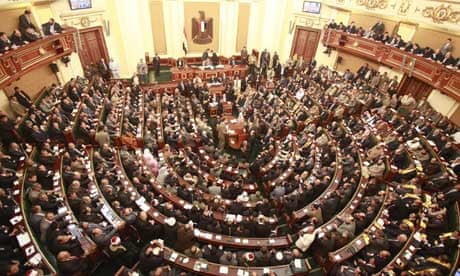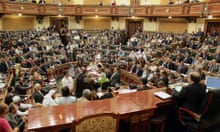Egypt's newly elected president Mohamed Morsi appears set for a confrontation with the country's military rulers after ordering the parliament to reconvene, in defiance of military decree last month which dissolved the legislature.
The move was the first in a series of decrees planned by Morsi against the military, according to Morsi's former campaign media coordinator Sameh El-Essawy, a member of the Muslim Brotherhood's Freedom and Justice Party.
"The military wants to create a state within a state, keep legislative power and include articles in the future constitution that protects it. That won't do: either we confront it now or we've failed," he said.
"They want to play the same kind of role the army does in Turkey," he added, "If the army maintains power in this way, then it wasn't a revolution."
Parliament was dissolved just two days before run-off elections that brought Morsi to power. The legislature, which was dominated by the Muslim Brotherhood, was deemed invalid by the supreme constitutional court, in a ruling which was swiftly ratified by the supreme council of the armed forces (Scaf), Egypt's military rulers.
The dissolution of parliament was denounced by opposition activists as a carefully-orchestrated soft coup to help Scaf remain in power. After his election victory, Morsi made conciliatory noises to the military – prompting fears among secular activists that the two sides had reached a power-sharing deal – but parliament remained a sticking point between the Islamists and Scaf.
"This decision shows that there was no deal between the Brotherhood and Scaf," said El-Essawy.
And hints of a deal seemed unlikely after Morsi's decree, which stipulated that parliament reconvene and continue its duties until a new assembly is elected, scheduled for 60 days after Egypt drafts a new constitution. Morsi's decree directly contradicts Scaf's wishes, and underlines his determination to take control of the country's executive.
Morsi's decree is a reversal of the Scaf decision to dissolve parliament, not the SCC ruling that deemed it invalid, said El-Essawy. "He reversed the Scaf decision, using the same executive powers they had. He has not reversed the court ruling which he respects and that's why a new parliament will be elected after the constitution," he said.
Elijah Zarwan, senior policy fellow for the European Council on Foreign Relations, said Sunday's move indicated the Brotherhood had been emboldened by Morsi's election victory.
"This is the latest in a series of uncharacteristically bold moves from the Brotherhood. Morsi is playing a poor hand to the hilt, signalling he will not easily submit to being the generals' scapegoat or pawn," said Zarwan.
The Scaf response was to convene immediately for an emergency meeting headed by field marshall Hussein Tantawi to discuss the ramifications of Morsi's decree, and what its next move will be. It has not yet made an official announcement.
"You can't mix the military with politics," El-Essawy said, "the more it interferes, the messier it gets, as we saw during the transitional period. I think Scaf will accept the decree, because Morsi is the elected president, the democratically chosen candidate with full authorities."
Morsi has been rather quiet since assuming the presidency at the beginning of the month. He has issued a number of decisions that cater to domestic grievances, including increasing bonuses on public sector salaries and pension rates. This also included military pensions.
Morsi is slated to visit Saudi Arabia on Wednesday in what will be his first official state visit as president. And having met US deputy secretary of state William Burns on Sunday, Morsi's spokesman announced that Barack Obama had invited him to visit the US during the UN general assembly in September.


